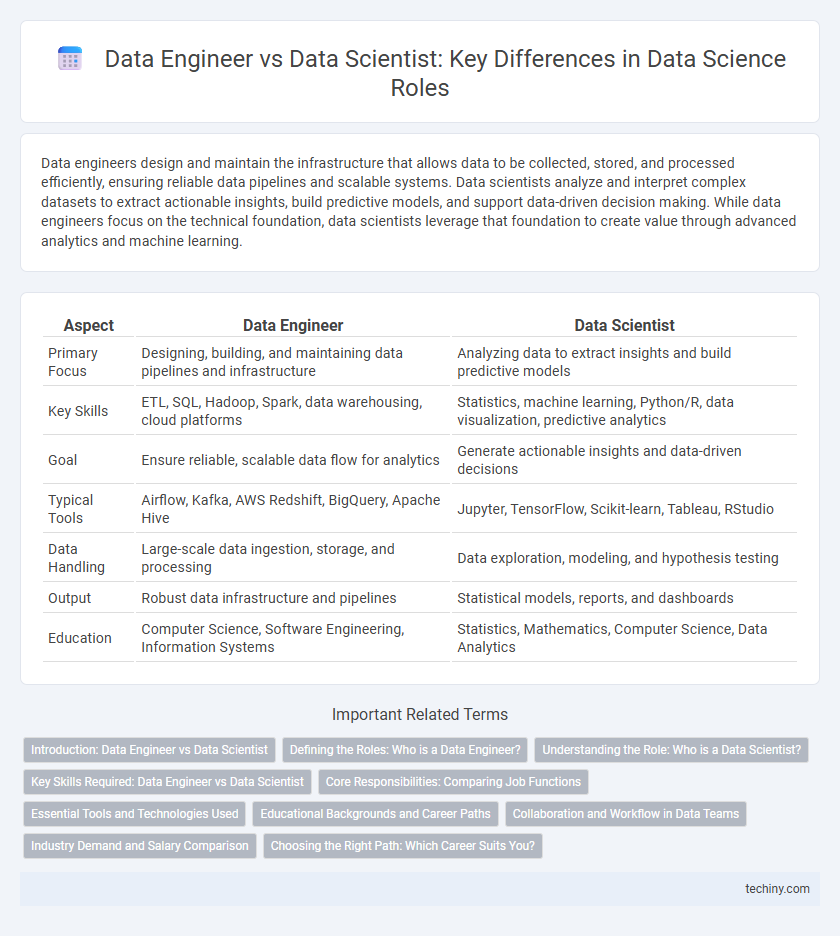Data engineers design and maintain the infrastructure that allows data to be collected, stored, and processed efficiently, ensuring reliable data pipelines and scalable systems. Data scientists analyze and interpret complex datasets to extract actionable insights, build predictive models, and support data-driven decision making. While data engineers focus on the technical foundation, data scientists leverage that foundation to create value through advanced analytics and machine learning.
Table of Comparison
| Aspect | Data Engineer | Data Scientist |
|---|---|---|
| Primary Focus | Designing, building, and maintaining data pipelines and infrastructure | Analyzing data to extract insights and build predictive models |
| Key Skills | ETL, SQL, Hadoop, Spark, data warehousing, cloud platforms | Statistics, machine learning, Python/R, data visualization, predictive analytics |
| Goal | Ensure reliable, scalable data flow for analytics | Generate actionable insights and data-driven decisions |
| Typical Tools | Airflow, Kafka, AWS Redshift, BigQuery, Apache Hive | Jupyter, TensorFlow, Scikit-learn, Tableau, RStudio |
| Data Handling | Large-scale data ingestion, storage, and processing | Data exploration, modeling, and hypothesis testing |
| Output | Robust data infrastructure and pipelines | Statistical models, reports, and dashboards |
| Education | Computer Science, Software Engineering, Information Systems | Statistics, Mathematics, Computer Science, Data Analytics |
Introduction: Data Engineer vs Data Scientist
Data engineers design, build, and maintain the data architecture and infrastructure that enable efficient data storage, processing, and retrieval, focusing on ETL pipelines and database management. Data scientists analyze and interpret complex data sets using statistical methods and machine learning to extract actionable insights and support decision-making. Both roles collaborate closely but differ in skill sets, with engineers emphasizing software engineering and data handling, while scientists prioritize analytical modeling and data-driven problem-solving.
Defining the Roles: Who is a Data Engineer?
A Data Engineer designs, constructs, and maintains the architecture, such as databases and large-scale processing systems, to ensure data is accessible and reliable for analysis. They focus on building data pipelines, optimizing data flow, and integrating diverse data sources to support data scientists and analysts. Skilled in programming languages like Python, SQL, and Scala, data engineers work extensively with tools such as Apache Hadoop, Spark, and cloud platforms to manage big data infrastructure.
Understanding the Role: Who is a Data Scientist?
A data scientist transforms complex data into actionable insights by applying advanced analytical techniques, machine learning models, and statistical methods. They focus on interpreting data patterns, creating predictive models, and driving decision-making processes to solve business problems. Unlike data engineers who build and maintain data architecture, data scientists primarily analyze and extract meaningful trends to support strategic initiatives.
Key Skills Required: Data Engineer vs Data Scientist
Data engineers require proficiency in programming languages such as Python, Java, and SQL, alongside expertise in database management, ETL pipelines, and big data technologies like Hadoop and Spark. Data scientists focus on skills in statistical analysis, machine learning, data visualization, and proficiency with tools such as R, Python, and TensorFlow. Both roles demand strong problem-solving abilities and a deep understanding of data architecture and analytics to drive data-driven decision-making.
Core Responsibilities: Comparing Job Functions
Data engineers design, build, and maintain scalable data pipelines and infrastructure to ensure reliable data flow and storage, focusing on ETL processes, database management, and system optimization. Data scientists analyze and interpret complex data sets using statistical methods, machine learning models, and data visualization tools to extract actionable insights and support decision-making. While data engineers prioritize data architecture and engineering practices, data scientists concentrate on modeling, analysis, and deriving business value from data.
Essential Tools and Technologies Used
Data engineers primarily use tools like Apache Hadoop, Apache Spark, and Kafka to build and maintain scalable data pipelines, alongside SQL and NoSQL databases such as MySQL and MongoDB for data storage. Data scientists rely heavily on programming languages like Python and R, utilizing libraries like TensorFlow, scikit-learn, and pandas for data analysis, modeling, and machine learning. Both roles often use cloud platforms such as AWS, Google Cloud, and Azure to manage and process large datasets efficiently.
Educational Backgrounds and Career Paths
Data engineers typically possess degrees in computer science, software engineering, or information technology, emphasizing skills in database management, ETL processes, and cloud platforms. Data scientists often hold advanced degrees in statistics, mathematics, or machine learning, focusing on data analysis, predictive modeling, and algorithm development. Career paths for data engineers lean towards building and maintaining data infrastructure, while data scientists concentrate on interpreting complex data to drive business decisions.
Collaboration and Workflow in Data Teams
Data engineers design and maintain the infrastructure that enables data scientists to access, clean, and analyze large datasets efficiently. Collaboration between data engineers and data scientists ensures seamless data pipelines, improving model accuracy and deployment speed. Effective workflow integration leverages the strengths of both roles, driving robust data-driven decision-making across organizations.
Industry Demand and Salary Comparison
Data engineers and data scientists both experience strong industry demand, with data engineers focusing on building and maintaining data pipelines, leading to growing opportunities in cloud computing and big data platforms. Salary comparisons reveal data scientists often command higher average salaries due to their expertise in advanced analytics, machine learning, and predictive modeling. Companies increasingly seek hybrid skills combining data engineering and data science, driving competitive compensation and diverse role opportunities across industries.
Choosing the Right Path: Which Career Suits You?
Data engineers specialize in building and maintaining data pipelines, ensuring data is accessible, clean, and reliable for analysis, while data scientists focus on interpreting complex data using statistical models and machine learning to derive actionable insights. Choosing the right career depends on your strengths: if you enjoy programming, system architecture, and data management, data engineering suits you; if you prefer analytical problem-solving, pattern recognition, and predictive modeling, data science is a better fit. Understanding these core roles helps align your skills and interests with industry demands, optimizing your career growth in the data ecosystem.
data engineer vs data scientist Infographic

 techiny.com
techiny.com